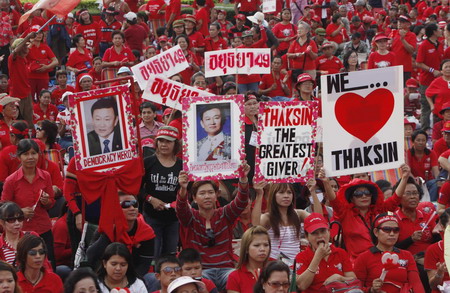 |
|
Supporters of exiled former premier Thaksin Shinawatra carry his posters and banners during a rally at the Democracy Monument in Bangkok October 11, 2009. [Agencies] 
|
BANGKOK: Thousands of supporters of deposed Prime Minister Thaksin Shinawatra, all in red shirts, rallied Sunday in Bangkok to demand the government step down and call fresh elections.
Supporters of Thaksin have been staging sporadic protests that have threatened to rekindle the political turmoil that has gripped the country since before the former leader was ousted in a 2006 military coup.
Sunday's protesters called for Parliament to reinstate the 1997 constitution that was abolished after the coup in addition to their demands that the government be dissolved.
"If the government is sincere, why not return to the old constitution, which was written by the people and for the people, and return the power to the public?" asked one of the protest leaders, Nattawut Sai-kua, adding that the protesters are collecting signatures to call for the removal of Prime Minister Abhisit Vejjajiva.
"Let's see who the majority vote for. I am sure it will not be this government," he said.
At least 2,000 people had flocked to a square in the historic heart of the capital by late afternoon with more expected to arrive later in the evening. About 1,000 policemen were deployed in the area, said Deputy Metropolitan Police Commissioner Worasak Nopsittiporn.
The protesters said they would disperse peacefully by midnight.
The popularly dubbed "people's constitution" - which was written with extensive public consultation and debate - was abolished by the coup makers in 2006 and replaced with a military-backed charter approved in a national referendum in 2007.
Critics say the 2007 constitution weakened political parties and shifted several responsibilities to the judiciary from the executive branch.
But anti-Thaksin activists say his supporters are only calling for the old charter - and the strong executive it creates - to rehabilitate the reputation of Thaksin who some accuse of installing a parliamentary dictatorship during his time in power.
Although Abhisit has said his government is willing to support amendments to the constitution, parliamentarians have not been able to reach agreement on the issue.
Few expect the protests to bring about immediate political changes, but the sporadic campaign has threatened to re-ignite tension between the pro- and anti-Thaksin factions.
Rival political groups have staged several rounds of sometimes violent protests. The turmoil began more than three years ago with rallies by those who oppose Thaksin - the "yellow shirts" - that paved the way for his ouster. But when his allies were voted back into power, the yellow shirts protested again - eventually occupying the seat of government and shutting down the capital's two airports.
When court rulings did in two governments made up of Thaksin allies, Abhisit came to power. But now the "red shirts" periodically hold demonstrations.
Thaksin was accused of corruption and abuse of power during his time in office, but he remains popular among the urban and rural poor. Last year, the billionaire politician was convicted in absentia of violating a conflict-of-interest law and sentenced to two years in prison.
Much of his fortune remains frozen in Thai banks, his Thai passport has been revoked, and he has been barred from several countries following diplomatic pressure from Thailand.

